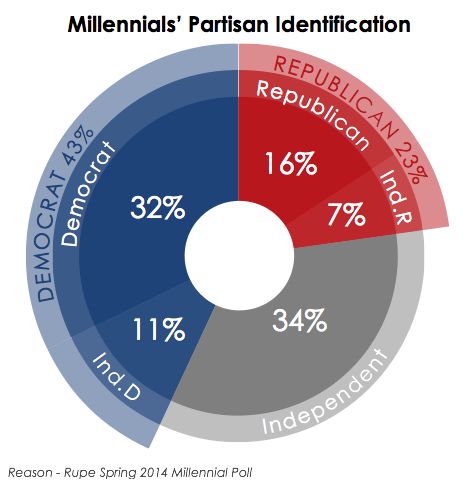Major Parties Fail to Appeal to Increasingly Independent Millennials

Millennials are leading the growing trend of voters who have no party affiliation. A report by Reason-Rupe revealed a majority of Millennials see themselves as independent of political parties.
According to the report, "When first asked, a majority of Millennials (52%) says they are politically independent of either the two major political parties."

Of the 2,000 polled, 52 percent do not identify as members of a political party though 11 percent lean Democratic, and 7 percent lean Republican. Voters over 30 hold much stronger partisan leanings -- only 11 percent said they were wholly independent, compared to 34 percent of younger voters.
The disparity in generational attitudes can be attributed to a wide variety of cultural and political factors.
Positions on social issues like marriage, views on sexual orientation, religious affiliation, and others have traditionally been associated with one or another political party. Yet, the average young voter today increasingly believes that neither their vote nor their voice are consistent with the choices that the two major parties give them.
When it comes to political factors, the report examined key issues on which a plurality of Millennials see neither party as in line with their attitudes. These include: promoting entrepreneurship, foreign policy, privacy, drug policy, and immigration.
Millennials will most likely be remembered throughout U.S history as the online generation. They have shaped the modern Internet, but are often thought of as careless with personal data; openly sharing personal information on social media websites like Facebook and Twitter.
Surprisingly, growing disapproval of both parties' handling of data privacy matters is exhausting young voters' confidence. About 50% trust neither party on the topic of privacy.
Mass surveillance programs like metadata collection are unfavorable with this age group as 55 percent oppose them. Any political party wishing to increase favor with this cohort should be wary of attaching privacy intrusions to protecting national security interests.
A plurality of 39 percent sees neither major political party as trustworthy when it comes to promoting entrepreneurship.
Fueled by economic factors, 15.2 percent of Americans between the ages of 18 and 29 are unemployed compared to the 6.1 percent of the general population, based on Bureau of Labor Statistics and Generation Opportunity reports. Another 1.936 million more are unaccounted for having given up on the labor force.
The younger generation came of age in an atmosphere of prolonged unfavorable war. Now, a plurality of Millennials (38%) trust neither the Democratic nor the Republican parties on foreign policy.
More politically aware, Millennials have a strong sense of dissatisfaction for the Iraq War (57%), as well as the War in Afghanistan (49%) -- costly overseas military engagements that have served as a foreign policy backdrop under both Democratic and Republican presidents.
Millennials are looking at the over one trillion dollars the 'War on Drugs' has cost the U.S. between presidential candidates from Nixon to Obama. Now, a plurality of Millennials (41%) see neither political party as having the right solution on drug policy.
Instead, they want to legalize marijuana and tax it too.
Diversity is the cornerstone of the Millennials' view of the future, which means more options, more opportunity, and more people. Being a generation not exclusively attached to the more extreme, racially-fueled incidents of the past, Millennials are the most tolerant age group in America.
Millennials differ from older generations on various issues relating to immigration and the path to citizenship. Eighty percent favor increased pathways for the naturalization of immigrants compared to 65 percent of Boomers, based on a 2014 Pew Research Poll.
A belief that immigration strengthens national interests is higher in Millennials than the general American Population (65% to 49%, respectively).
Finding their own path
The rising trend of independent Millennials is not surprising considering their opinions do not always fall within the paradigms of either of the two traditional parties. They are making their own decisions on immigration, privacy, drug policies, entrepreneurship, and foreign policy.
America's youth have lost faith in the traditional parties with 28 percent having no expectations of either party handling these issues, according to Reason-Rupe.
Young voters not only want but need solutions that are outside of the norm. The tawdry rhetoric of traditional parties does not draw in a Millennial who understands that choices are always better with more options.




